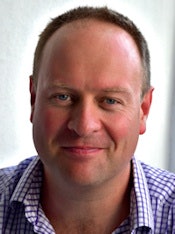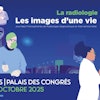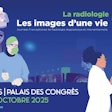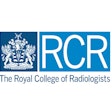
"Career structure is shackles for the young designed by their elders."
Our professional freedom is being steadily eroded. Our working lives are increasingly bound by external constraints. Annual appraisal is enough of a paperwork headache without considering the meaningless five-yearly exercise of revalidation that U.K. doctors now have to endure.
 Dr. Paul McCoubrie is a consultant radiologist at Southmead Hospital in Bristol, U.K.
Dr. Paul McCoubrie is a consultant radiologist at Southmead Hospital in Bristol, U.K.
In U.K. hospitals at least, micromanagement by individuals in gray suits is reaching new heights -- or lows, depending on how you look at it. Regular circulars arrive from the said clipboard-wielders, bearing illogical dictats or mandating protracted training courses on hitherto mundane tasks. A senior doctor at a hospital not far from my own had to attend a mandatory one-hour session on hand washing. I'm not joking. What next? Perhaps an enforced course on "Combating ano-olecranon dysagnosia?"
More pertinent to our radiological work, training in a subspecialty or introducing new techniques or modalities to local practice often now require some kind of formal box to have been ticked: attendance on a recognized course, compilation of a logbook of a certain number of cases, and training at a particular accredited center of excellence.
In many respects, medicine is merely catching up with the rest of the U.K. National Health Service (NHS). The overt bureaucratization of the NHS has been an unstoppable rollercoaster for a time. Doctors rarely say that they can't do something because they "haven't been on the course." However, juniors do now say, "I don't know that patient, I'm covering the other side of the ward," so who knows what the future holds?
An oft-repeated maxim is that we should raise professional standards and improve standards of practice. This truism is undeniable; our punters deserve the best quality care we can give. Attempting to raise standards is also a constructive way of dealing with the increasingly fashionable sport of "doctor bashing." As a result, tightening control on training, accreditation, and reaccreditation of specialists is now the unquestioned predominant method for the powers-that-be to solve the ills within medicine.
This isn't the whole story, though. I would contest that this "tightening control thus protecting patients" motif is being used as a stick to beat us.
Firstly, it seems that the more furious the turf war between specialties, the more hoops the "wannabe practitioner" has to jump through. For example, being judged competent in defecating proctography is significantly less hotly contested than sexier techniques like carotid stenting. No one will ask to see your logbook of 300 venograms from the last year whereas the regulators will want to see your annual reporting figures for PET/CT "to maintain competency."
Secondly, it tends to cost doctors more than other specialties, or even other professions. The monopoly status of accrediting bodies and perceived richness of doctors allow limitless charges. Enforced fee hikes in the U.K. are particularly sickening, given admissions that medical training budgets have been unashamedly raided to bail out NHS debt.
Such perceptions do invite criticism of our medical highers and betters. These gripes mainly circle around protectionism issues: stifling the growth of a modality, "ivory-tower" elitism, and monopolization of private practice.
However, my major concerns about all this excessive regulation are much more fundamental. My concerns are over the hegemonic assumptions that: (i) more structure in training and education is better; and (ii) counting numbers of cases is a valid way of assuming competency.
For those unfamiliar with the term, I use hegemony to mean "[N]ot only the political and economic control exercised by a dominant class, but its success in projecting its own particular way of seeing the world, human and social relationships, so that this is accepted as 'common sense' and part of the natural order by those who are in fact subordinated to it."
This is where heterodoxy enters in. It is the antonym of orthodox, describing someone at variance with established belief; in other words, "cynicism with knobs on." The heterodox does include swivel-eyed conspiracy theorists as well as Trotskyite anarchists. However, I must distance myself from such subversives. I merely believe it is good and healthy to critically reflect on the social hierarchies within our profession.
You can read more about this in part two, which will follow soon.
Dr. Paul McCoubrie is a consultant radiologist at Southmead Hospital in Bristol, U.K.
The comments and observations expressed herein do not necessarily reflect the opinions of AuntMinnieEurope.com, nor should they be construed as an endorsement or admonishment of any particular vendor, analyst, industry consultant, or consulting group.



















